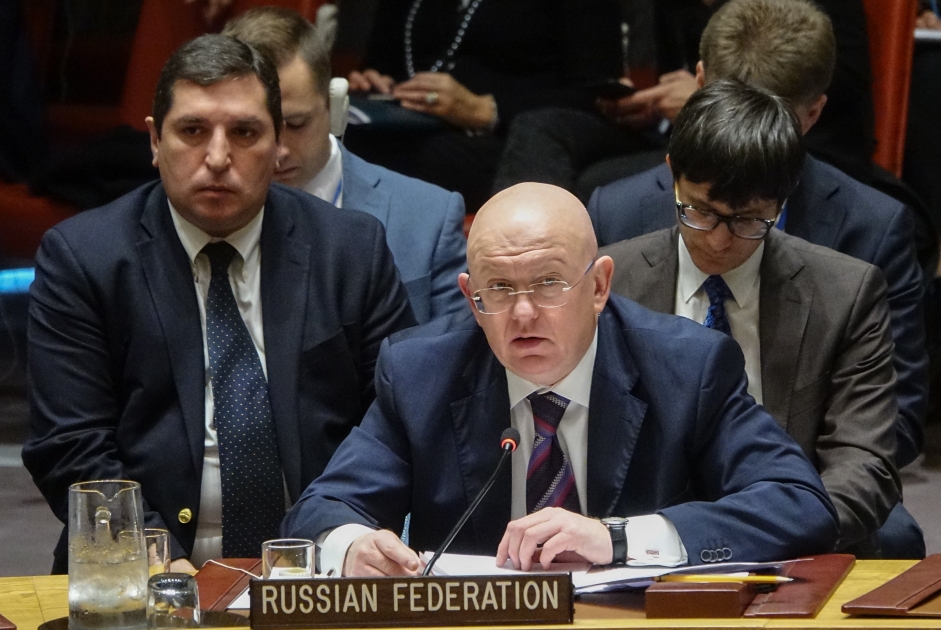Statement by Ambassador Vassily A. Nebenzia, Permanent Representative of the Russian Federation to the United Nations, during the UN Security Council meeting on the situation in Lybia
We thank you, Mr. President, and we are pleased to have you in the Chamber today. We are grateful to Mr. Ghassan Salamé for his briefing. We very much hope that he can execute his difficult task of helping to unify Libya and we sincerely wish him every success. There is no alternative to that path if the aim is to end the crisis as soon as possible and put a stop the threats emanating from Libya, including terrorism.
The country’s complicated situation is still extremely worrying. The political fragmentation continues, the authorities disagree with one another and armed groups, some of them radicalized, control large areas. Terrorists are hiding out in remote corners and remain dangerous despite having suffered losses. Various forms of criminal activity are flourishing, set up by the criminal networks that have enmeshed the entire Mediterranean region, and there is evidence that the contraband activity may be reaching Europe. The Libyan economy is clearly in dire straits and the social sector is in bad shape. The situation of permanent chaos is having a detrimental effect on the Libyan people, who are sick of living with the protracted consequences of the adventurist military undertaking of 2011.
However, there have been some encouraging moments suggesting there may be hope for a certain amount of progress in the political process. It appears that those Libyan leaders with common sense realize that the crisis can be resolved only by political means. The obligation to refrain from the use of force is crucial, as is their demonstrated willingness to act based on the Libyan Political Agreement in order to implement the arrangements previously agreed to on establishing national institutions and law enforcement bodies.
We should not omit to note the Libyans’ intention to hold elections under United Nations supervision in accordance with Mr. Salamé’s action plan. We would like to be sure that in both Tripoli and Tobruk they have understood that the only way to deal with this crisis is through joint efforts at the negotiating table. If not, the country will be plunged into even greater chaos, fraught with irreversible consequences for the Libyan regime.
We support the efforts that have been undertaken under the auspices of the United Nations and welcome the signs we are seeing of momentum in finding solutions. As a long-time friend of Libya, Russia will continue to assist it in that regard. We have been working systematically with the Libyan parties since the signing of the Agreement in Skhirat, guided by the imperative of preserving Libya’s sovereignty and territorial integrity.
We encourage the Libyans to overcome their internal differences and seek mutually acceptable solutions on all disputed issues. We stress the importance of promoting a constructive dialogue and ensuring that it is broadly representative.
Much remains to be done on that front, since various political forces in Libya are still sitting on the sidelines of the political process. However, our principled position is that the Libyan people themselves must decide their country’s fate and that attempts to impose ready-made schemes on them would be counterproductive.
There is still significant work to be done in order to arrive at lasting agreements on the parameters for national reconciliation, and in that connection it will still be vital to ensure dynamic international support to the political process in Libya so as to promote stability during its transitional period. We should consolidate that support and ensure that no needless competition is involved, thereby avoiding the creation of any new dividing lines.
That also applies to the various forms of practical assistance provided by Libya’s foreign partners, including the various so-called training programmes. The efforts of the United Nations will be successful only if we all play by the same rules. We appreciate the importance of the steps taken by international and regional sponsors of the political process in Libya, including its neighbours, but the United Nations should continue to take the main coordinating role.
Our colleague Mr. Olof Skoog, in his capacity as Chair of the Security Council Committee established pursuant to resolution 1970 (2011) concerning Libya, has briefed us on the subsidiary body’s recent activities.
For our part, we note that the problem of the uncontrolled circulation of weapons in Libya is still acute, especially in the absence of a unified army and other law-enforcement bodies. It affects security both in the country and the Sahel-Saharan region, which is why it is crucial to ensure that the arms embargo is strictly observed. In the circumstances, it would be premature to start talking about relaxing the current sanctions regime.
As far as illicit exports from Libya of oil and oil derivatives are concerned, that represents a serious problem for the national economy. However, Sanctions Committee measures should be strictly applied based on real, verified data and in line with the parameters established in the relevant resolutions of the Security Council, with no free interpretations of the rules.
